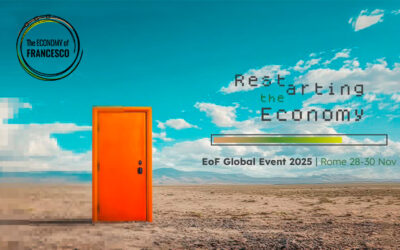In his homily on Good Friday 2020 in St Peter’s Basilica (Rome) the Capuchin Father, Raniero Cantalamessa, said that “there are things that God has decided to grant us as the fruit both of his grace and of our prayer”. The following writing by Chiara Lubich is an invitation to collaborate with God by asking for graces and putting ourselves in the best situation to obtain them. “So when you are offering your gift at the altar, if you remember that your brother or sister has something against you, leave your gift there before the altar and go; first be reconciled to your brother or sister, and then come and offer your gift” (Mt 5:23-24). With this Word of Life, Jesus has told us clearly that there can be no union with God, real worship or authentic prayer unless we are reconciled with our brothers and sisters. So let’s hope that his message has entered deeply into our hearts. It is with this hope that I would like to speak to you about prayer, which, if we live this way, is certainly acceptable to God. I would like to speak, in particular, about the prayer of petition: that is, our asking for help and for favours. I have the impression that some of us may not stress it enough, and perhaps this is for very noble reasons: now that we have become more deeply involved in our faith and have begun to practice our religion much more, we have understood that religion is not simply a matter of going to church and repeatedly asking for things, but of loving God and, therefore, of giving. And to do our part, as we say, we have committed ourselves to living out all those principles of the Gospel that our spirituality emphasises. Certainly this is all well and good. Nonetheless, we must realise that loving God means many things. It implies keeping all his commands. And one command that Jesus repeats insistently is to ask: “Ask, and it will be given you; search, and you will find; knock, and the door will be opened for you.” (Mt 7:7). So what should we do, then? We should ask more and ask in a better way because this is what Jesus wants. It’s another way to show him our love. … Certainly we pray and that means we don’t rely only on our own strength. Nonetheless, we can improve in two directions: first of all, not by multiplying the number of our prayers, but by becoming more fully aware of what we are already asking for. If we reflect for a moment, we’ll see how many graces we ask for in the prayers [we already say]. … Secondly, we can improve, as the saints point out, by praying in such a way that we receive what we ask for. Our prayers are heard if we ask with humility, aware that we can do nothing on our own; with trust, confident that with God we can do anything; and with perseverance, lovingly insistent, as Jesus wants us to be. In short, we must focus on the requests we already make, giving them greater attention, and expressing them better each time, praying with the same effort that we put into living our Ideal. In this way, everything we do will be more fruitful. And let’s pray while we still have time! I always remember the advice given us by the mother of one of the first focolarine just before she died: “Pray during your life, because at the end you won’t have time”.
Chiara Lubich
(From a telephone conference call, Rocca di Papa, 16th February 1984)




0 Comments